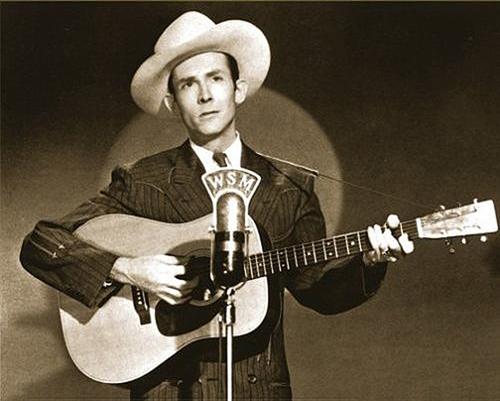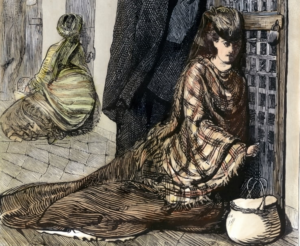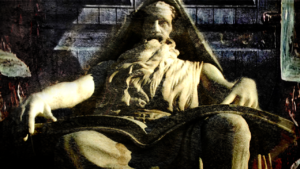The Cosmic Fool

The Cosmic Fool
In our time ‘The Idea’ is on the tip of everyone’s tongue. Yet, like a diver paralyzed with fear at the end of a diving board, the burgeoning idea stands on the edge unable to jump, or tumbles off with a belly-flop. Most do not see that hidden social barriers restrain The Idea.
There is a character in this cosmic play which is the harbinger of a new Idea – he has something close to the innocence of a child – he is The Fool. He delivers The Idea’s message unthinkingly, with the boldness of the hero, and the passion of a villain. Such harbinger, born into a time when an Idea has come, will one day stand in line with great geniuses of history, despite their lack of self-awareness. It is this Cosmic Fool which stands before the divine, staring into the light as others look away.
There are many examples of this type of person: the harbinger, the message-bearer.
- Hank Williams Sr.
Born Hiram King Williams (Hank for short) he was a drunk, a liar, and an adulterous misanthrope that few could stand the company of. In fact one of Hank’s idol musicians Roy Acuff, who he met at the Grand Ole Opry, famously said of Hank:
“You’ve got a million dollar talent in a ten-cent head.”
Hank, who dropped out of school as a child to pursue music, was born in a time where there was a new feeling emerging. He was the first to blend the sadness of Delta Blues with the upbeat tempo and story structure of Western Folk to create the Genre of country music. In 1946 when Hank brought his new style to the masses he soared to the top of the billboards in a very short time. He was act-number-one on the hit parade, coining 40 hit songs, and 11 that debuted at number one.
What was occurring in the consciousness of man at that time that made everyone so melancholy, that such sad music was so popular? This is a question that Hank never asked, nor did he care. It was simply that his voice and stories emulated the lonesome whistle of the midnight train he so much identified with, and his songs resonated in the hearts of the american working class and with those that had lost loved ones during the war. Hank Williams’ music is defined by an isolated individualistic hedonism, one which ended his life, dead of an overdose on the way to another gig in the back of his mass-produced Cadillac.
Hank was there at the right time for an idea to be born, and as the cosmic messenger too drunk to understand it, he broadcast it to the world in all it’s unfiltered glory.
- Dead from Mayhem
Per Yngve Ohlin, better known by the stage name ‘Dead’, defined a genre with his life, both on and off the stage. Dead was the second lead singer of the Norewegian Black Metal band ‘Mayhem’, and his vocals, as well as his innovative corpse paint and the ways in which he outed posers by throwing pig heads in the crowd and showering them with his own blood, defined black metal as an aesthetic. In his private life Dead was an impossible person to know: he was isolated, depressed, uninterested in friendship or comradery.
Unfortunately not much of Dead’s musical contributions remain, as he infamously ended his life with a shotgun blast to the head (after slitting his wrists). This was documented by the late founding member of Mayhem, Euronymous, for the cover of the Mayhem album: “Dawning of the Black Hearts”. Dead was in communication with something from beyond, or at the very least he was completely off-his-rocker. However, in no way was he communicating unwanted or foreign ideas for his time. He was present, along with Euronymous and Varg Vikernes of Burzum (who later killed Euronymous) to be a part of a particular and popular brand of youth disenfranchisement.
Black Metal would define a generation of anger in opposition to the hedonistic nihilism of mob corporate-culture. By taking inspiration from Pagan spirituality they produced a primal feeling with an often brutal and ancient quality. Dead was there from the beginning, to scream and retch this re-awakened darkness into the human experience, a rebirth that still evolves today.
Italian Futurist Umberto Boccioni
As the key artistic figure in the Italian Futurist movement, Artist Umberto Boccioni was a wild-man. He was fast, violent, angry, sex-crazed, and a complex eccentric. When he took on the voice of Italian Futurism’s creator Fillipo Marinetti, he worked obsessively to define the movement’s art style. He created the concept of Dyanism – motion captured in a still image.
Boccioni would give futurism it’s defining aesthetic, inspired by ideas related to the industrial revolution. When the salon’s rejected Futurism, Boccioni banded together with artists, poets, and fellow futurists to ransack the galleries with baseball bats, declaring all works shown inferior to futurism (later depicted in his piece “Riot in the Galleria”).
I’ve always admired the futurists for the attitude that nothing that came before was good enough for them, creating their own limitations and forcing themselves to invent a futurist way of doing everything. Boccioni did not argue with critics of futurism, he met them in person and fought them with fists, causing many critics of futurism to fear for their lives.
Boccioni had aspirations beyond art and decided the only way to be taken seriously (politically) was to join the military. However Boccioni fought on the battlefield only a handful of times before falling off his horse and being stomped to death at the age of 33.
Boccioni, Dead, and Hank Williams might seem like a strange assortment of people, but all were able to deliver the right message, to represent The Idea when The Idea’s time had come, despite themselves. But what can we learn from this?
Do we ever learn anything from expressions of crazed individualism? I have my doubts, but by following these messengers we do learn about the human condition. The cosmic fool (as archetype) is unrepresented in the dialogue of our time, the fool tries to remain in the bounds of the mortal, but his soul does not allow him to remain so restrained.
Nature knows well that it is best to communicate an idea when it’s time is come, herself producing the power of a collective, united on the idea. This is preferrable to a raving madman with no plan and only a short time before the constraints of the body become too tight.
For the stupid and beautiful soul is impatient and wild.











